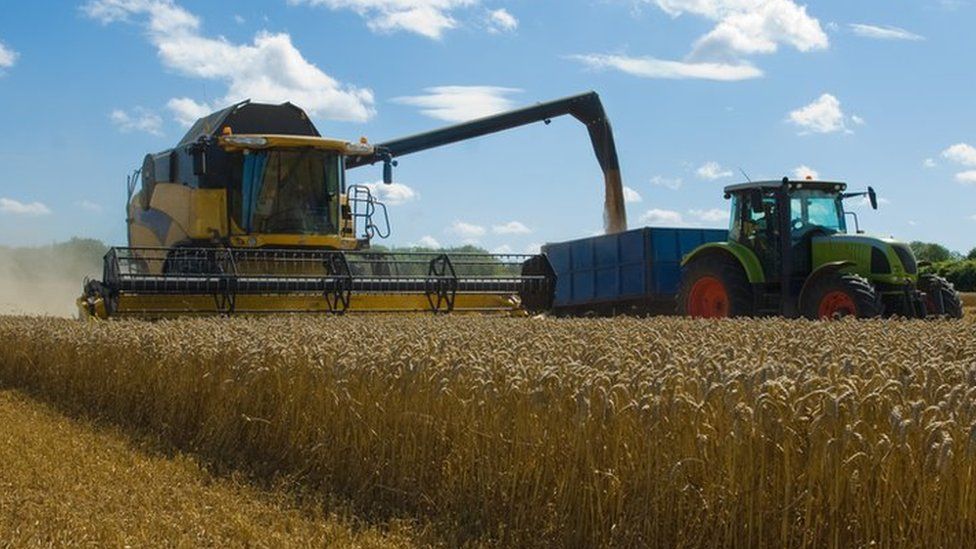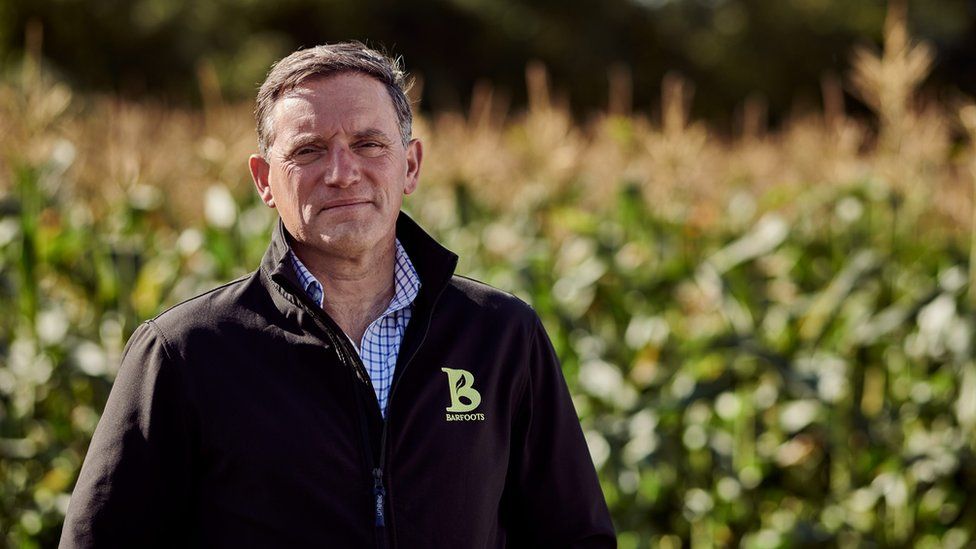
Rishi Sunak is to meet with food industry leaders, as soaring prices continue to hit firms and households.
The prime minister will host a "Farm to Fork" summit with delegates from farming, food production and supermarkets on Tuesday.
Farmers and businesses have been hit by rising operating costs, in part caused by Russia's invasion of Ukraine.
They are expected to discuss how the UK can improve the way it produces and sells food, and boost production.
Ahead of the summit, the government unveiled a package of support for farmers, at a time when many have warned their businesses are at risk due to soaring prices.
Some have also argued that supermarkets not giving them a fair deal for certain goods, such as eggs.
Late on Monday, the government set out plans to put greater emphasis on farmers' interests in future trade deals and said it would review horticulture and egg supply chains to "ensure farmers get a fair price for their produce".
It also pledged invest £30m to "unlock new technologies" and make 45,000 visas available again to the horticulture sector next year to recruit fruit and vegetable pickers from overseas.
The government said the measures would "strengthen food security and grow the economy".
"Supporting our farmers and food producers must, and always will be, at the heart of our plans to grow the economy and build a more prosperous country," Mr Sunak said.
Minette Batters, president of the National Farmers' Union, welcomed the government's announcement and said they showed "a recognition and an understanding of the strategic importance of British food and farming to the nation".
Rising food prices are one of the main drivers behind the rise in the cost of living.
Consumer group Which? said food inflation in particular remained at "shockingly high levels", with some meat, yoghurt and vegetables cost double what they were this time last year.
Your device may not support this visualisation
The consumer group also found supermarket own-label budget items were up 25% in April compared with the same time last year.
The UK's competition watchdog has launched an investigation of supermarkets over high food prices, but the British Retail Consortium (BRC), which represents retailers, has said they are "doing all they can to keep food prices as low as possible".
It has previously said there is typically a three to nine-month lag to see price falls reflected in the shops, following falls in wholesale prices.
Ahead of the summit, the BRC called on the government to streamline regulation around recycling, packaging and Brexit to try to bring down prices for consumers.
Karen Betts, Food and Drink Federation chief executive, said the summit risked "being a missed opportunity" to address inflation.
She said the meeting must look at "costly and heavy-handed regulation, post-Brexit labelling requirements, skills shortages and the complexity of border checks, all of which are pushing up costs".


We've been hearing for months about the pressures our farmers and growers have been facing, from sky high costs and labour shortages to extreme weather.
Some have had to produce their food at a loss, others have been planting less leading to warnings that farmers are facing an existential crisis.
They want a fairer price for their produce. Meanwhile supermarkets are under increasing pressure to bring food prices down. Something has to give.
Former Sainsbury's boss, Justin King, says we've been through a golden era of cheap food. But getting the balance right is a hard circle for the government to square in a cost of living crisis.

Martin Lines, who farms in South Cambridgeshire and is chair of the Nature Friendly Farming Network, said business for some farmers was "unsustainable" due to huge cost increases for animal feed and fertiliser.
He said the industry needed a "long-term strategy" and "not just sticking plasters" from the government.
Julian Marks, chief executive Barfoots, where vegetables are grown on 8,500 acres (3,439 hectares) across the south coast of England, said costs have risen by as much as 30% in the last year.
"Home-grown food is a very useful, strategically important thing to have in the world we now live in," he said.
But with profitability halved and national minimum wage costs up 40% in five years, "it's pretty depressing", he added. "We're definitely not able to pass all our costs on," he added.

The business needed about 700 seasonal workers, but Mr Marks said the company had to rely on workers from further afield.
His comments come after the Home Secretary Suella Braverman said there was "no good reason" the UK could not train its own fruit pickers to bring immigration down.
Related Topics
https://news.google.com/rss/articles/CBMiLGh0dHBzOi8vd3d3LmJiYy5jby51ay9uZXdzL2J1c2luZXNzLTY1NTk2NTAy0gEwaHR0cHM6Ly93d3cuYmJjLmNvLnVrL25ld3MvYnVzaW5lc3MtNjU1OTY1MDIuYW1w?oc=5
2023-05-15 23:02:20Z
CBMiLGh0dHBzOi8vd3d3LmJiYy5jby51ay9uZXdzL2J1c2luZXNzLTY1NTk2NTAy0gEwaHR0cHM6Ly93d3cuYmJjLmNvLnVrL25ld3MvYnVzaW5lc3MtNjU1OTY1MDIuYW1w
Tidak ada komentar:
Posting Komentar